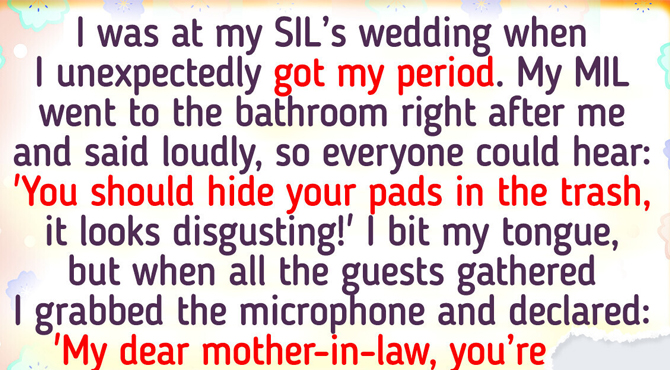Being humiliated in public is a nightmare for most of us. And if your mother-in-law is the one responsible for your embarrassment, the situation can become even more complicated. Would you seek revenge, or would you choose to remain silent to keep the peace in the family? One of our readers reached out to us with her story about standing her ground, but now she’s unsure whether she made the right choice.
Here is letter:
Hi,
I’m 34 and have been married to my husband for five years now. I was at my SIL’s wedding when I unexpectedly got my period. My MIL went to the bathroom right after me and said loudly, so everyone could hear: ‘You should hide your pads in the trash, it looks disgusting!’ I bit my tongue, but when all the guests gathered I grabbed the microphone and declared: ‘My dear mother-in-law, you’re absolutely right.
In fact, let’s all give a round of applause to the expert in public hygiene and tact!” The room fell silent.
At first, I regretted it-I’m not usually one to stir up drama, but I’d had enough of her constant passive-aggressive comments over the years. To my surprise, a few guests started clapping hesitantly, and then more joined in. There was an awkward tension, but at least the spotlight had shifted away from my ‘disgusting’ pad to something much bigger: her embarrassing behavior.
After that, I went back to enjoying the wedding, but I could feel my mother-in-law’s icy stares burning into my back from across the room. Every time I glanced in her direction, she was either whispering to someone or giving me that disapproving look she’s perfected over the years. The rest of the evening was a mix of awkward silences and forced smiles as I tried to refocus on celebrating the bride and groom. But deep down, I knew this incident wasn’t over.
Now, a few days later, I can’t stop thinking about what happened. On one hand, I’m proud that I stood up for myself, especially after years of enduring her subtle digs and condescending comments. But on the other hand, I’m starting to wonder if I went too far.
My husband and I haven’t discussed it in depth yet. He’s trying to avoid conflict, as usual, but it’s clear his mom’s attitude has affected him too. Now I’m grappling with whether I should reach out to my mother-in-law to apologize and keep the peace, or if I should hold my ground and make it clear that her behavior won’t be tolerated any longer.
Apologizing feels like backing down, but staying firm might make things worse. I’m really struggling with what the right move is here. Looking forward to your advice.
Sincerely,
– Cindy
Thank you, Cindy, for sharing your story with us. The situation is indeed complicated, and navigating relationships with your in-laws can be stressful. We hope that the advice we’ve gathered for you will help you maintain a good relationship with your mother-in-law while standing your ground.
Talk to your husband first.
Before taking any action, have an honest conversation with your husband. Understanding his perspective will help you gauge how to approach the situation as a united front. This way, he won’t feel stuck in the middle, and you’ll have his support moving forward.
Reflect on your emotions.
After any emotional conflict, it’s important to step back and give yourself the space to truly understand what you’re feeling. Perhaps you felt embarrassed, knowing that others overheard a private matter being called out publicly. Or maybe you were frustrated because this isn’t the first time she’s made a snide remark in front of others.
Take the time to reflect on what emotions you were experiencing in the moment. Understanding this can also help guide your next steps.
Consider the context.
It’s no secret that weddings can bring out heightened emotions in everyone involved. The day is usually filled with anticipation, expectations, and sometimes, underlying family tensions.
Take into account the stressful nature of the day for both you and your mother-in-law. Reflecting on how the charged atmosphere of the wedding may have impacted both your reactions can help put the situation in perspective. It’s possible that both of you were responding to the stress of the day, rather than acting purely out of malice or hurt feelings.
Decide if an apology is necessary.
Apologizing can be a powerful tool in conflict resolution, but it doesn’t have to mean that you’re taking full responsibility or admitting that your actions were completely wrong. Instead, think of it as a way to acknowledge the fact that the situation got out of hand and express a willingness to move forward.
If you feel that offering an apology would help ease some of the tension, you can say something along the lines of, “I’m sorry for how things escalated at the wedding. I was caught off guard, and your comment really hurt me.” This kind of apology allows you to take responsibility for your reaction while still expressing how her behavior affected you.
Prioritize your well-being.
At the end of the day, prioritize your own mental and emotional health. If your mother-in-law’s behavior continues to affect you negatively, it’s okay to create distance or minimize interactions for your peace of mind, even if that means keeping the relationship polite but distant.
Whose side would you rather take, the author’s or her mother-in-law’s? Do you have any stories to share about times when you needed advice on how to behave with your in-laws?
